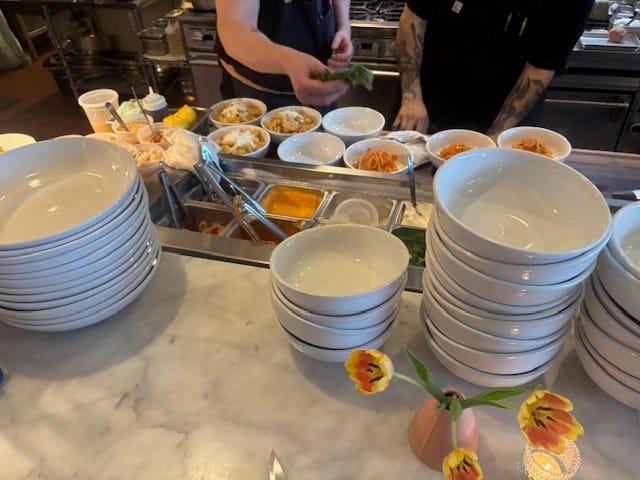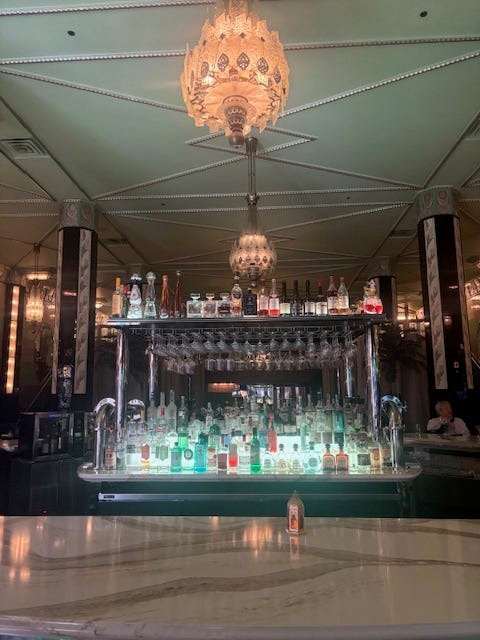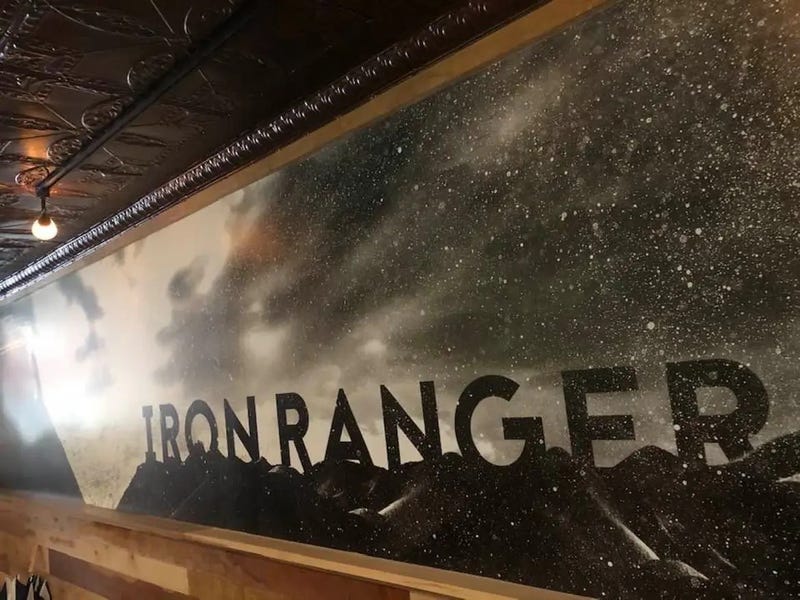
The Twin Cities is known for its vibrant, innovative restaurant scene and award-winning chefs. But at the same time, we all know that feeling when one of our favorite local restaurants closes, sometimes overnight, without any warning.
In this month's "A Closer Look with Laura Oakes," she finds that for as many unfortunate shutdowns, there are just as many wild success stories in a challenging industry that is good at keeping diners guessing.
At the bustling chef's counter at cozy Estelle in St. Paul’s Macalester-Groveland neighborhood, you’d never imagine worries over job security might be dogging the highly experienced cook who pan-flips perfectly al dente rigatoni with one hand, while throwing a healthy pinch of spice into one of five other bubbling pans.
But a new report from the trade group Hospitality Minnesota confirms what many restaurant owners could already tell you: they have not fully recovered from the COVID-19 pandemic.
And while the report also includes Minnesota resorts and hotels, nearly 36% reported their business was in some state of decline.
In the restaurant world where financial headwinds are strong and profit margins are miniscule, some have had to shut down altogether.
Among the higher profile closings in recent months, Tim Niver's Saint Dinette in Lowertown St. Paul, which was also the backdrop for his Niver Niver Land podcast.
As he inched toward that final day of service, Niver conducted nine week's worth of exit interviews with his beloved staff, like general manager Nicole.
"Yeah, it's been wild to hold that standard and to get people to buy into that with you. It's not a small feat," she says.
"You didn't keep your job eight years here because you didn't do it well, but also so many people that work with you kept their jobs the whole time too. It's a big credit," Niver tells her.
And then at the end, the tables and microphones were turned, allowing staff to be the ones asking questions.
"This place isn't a party because it is a living thing, but if we look at it for a moment under the lens of it being a party, and that you are hosting the party, and the party has to end at some point," says server Daniel, "why does the party end now?"
"Well, I think time is too strong of a thing to overcome, and a lot of times your time is just ultimately up," answers Niver. "You know, we - I don't wanna go. Also, 10 years is so long, like this amount of time, and o much has happened within it."
President and CEO of Hospitality Minnesota Angie Whitcomb says hurdles facing an industry that hasn't fully recovered from the pandemic are almost too many to mention, including the huge extra expenses incurred by new state laws involving earned sick and safe time, and paid family and medical leave.
"And the cost of doing business has increased," Whitcomb begins. "Employees are more expensive. We are one of four states without tip pooling - that prohibits it. We're one of seven without the tip credit. And we are the only state that has a price transparency law that doesn't exempt Hospitality. And so the one tool that a lot of restaurants had left in their toolbox, that fee, would help create equity between back-of-house staff and front-of-house staff."
But one Twin Cities industry-watcher says the restaurant world is always an up and down ride. Joy Summers is a food and drink reporter for the Minnesota Star Tribune.
"I've seen a couple of dire headlines of what's happening now, what will happen next, all these," Summers explains. "Restaurants are closing and I've had the opportunity to cover the Twin Cities and Minnesota restaurant scene for around 15 years now, so I can say honestly it's cyclical. There are slow seasons and there are busy seasons."
And, pandemic aside, Summers says there are all kinds of ways restaurants can slide or fall apart. Making the numbers work when you have to pay higher wages in a staffing shortage, affording the rising cost of your ingredients, and getting by on razor-thin profit margins as little as 3-4%. Even the recent egg shortage - something Summers says hit one restaurant she recently visited especially hard.
"They couldn't serve most of their breakfast menu because they didn't have eggs," she says. "Their egg supplier had fallen apart and they just couldn't make their dishes and they couldn't close, because they needed the opportunity to make a little bit of money to be able to carry through. So it was just the restaurant owners, and oh my heart broke for them. Because how hard to look at people and say, 'I can't give you what you think you want, but please take a chance on me,' and try this other thing."
Veteran Restauranteur David Fhima knows the challenges well

Longtime chef and restaurateur David Fhima knows those challenges well, having weathered good times and bad, exciting openings and difficult closings. It doesn’t sit well when he hears of seemingly well-established places like Revival and Saint Dinette shutting down.
"Nothing is more heartbreaking than hearing it," Fhima says. "I have done it. I have done it a few times. If you've been open for 15 years or if you've been open for 18 months, that closing of a restaurant is very, very difficult and when I hear that, I am in pain. I'm in pain and I worry. I worry about our industry in the Twin Cities. Because, yeah, I don't worry about the people who are veterans in our industry because they're just like me. They know how to survive. It's the new chefs, the new restaurants, and I don't want them to get a hit and give up because we need them more than we need the old guard like me. They are the future."
Speaking of the future...
"This is my son, Eli. What did you make? Tea?" asks Fhima.
"We have Moroccan gree mint tea. Gunpowder, fresh mint, local honey," explains Eli. "The higher we pour, the more welcome you are."
"So I don't know how high that's gonna go Laura," jokes Fhima.
Fhima’s been called an energizer bunny and admits he's also been called an ass. He owns coffee shops and upscale French and Moroccan-inspired restaurants in downtown Minneapolis, is about to open another with a Sicilian focus in Excelsior, and oversees the food offerings at Target Center for the Minnesota Timberwolves and Lynx, along with Lifetime Fitness.
Fhima is tough on his employees in a way like you might see on a reality cooking show, but says he values them above all else. And as he prepares to hand off his business to son Eli one day, he’s hoping to instill a big lesson that has guided his success the whole way.
"You survive in this industry for three reasons: relationships, relationships and relationships," Fhima explains. "Relationship with your landlord, relationship with your staff, relationship with your customers, relationship with your vendors. And relationships have nothing to do with business. Zero. They have nothing to do with food. It has to do with, like I said, a trust level that happens between you and the vendor, your staff, your customer, that tells them that you are worth taking a risk."
And along with those life lessons comes gratitude.
"It takes years to build a brand and it takes a few mistakes to kill it," Fhima tells Oakes. "The wonderful thing about this amazing country is that if you're sincere, you never kill anything permanently. People like to see you succeed. They like to see you rise back up. I love that. I love that. I mean, that's the thing that always, always has given me wind in my back."
St. Paul's Iron Ranger hopes to lead a resurgence on Grand Ave.

Where Fhima’s in downtown Minneapolis glistens with opulent chandeliers, glimmering bronze lanterns, and feels like a parade of 18th century Moroccan royalty could appear at any time, Tom Forti’s Iron Ranger in St. Paul has a hockey-puck meets a Hamm's and homemade pasty kind of vibe.
A framed Bob Dylan poster and an antique Greyhound Bus sign reflect Forti’s Hibbing roots, and his journey to finding his footing in the restaurant world.
"Before I did Iron Ranger, it was Sunrise Market and Cafe, which was the extension of the family business," Forti says. "But it just became more and more clear that I needed something that's my own. Not like what my great-grandfather started 100 years ago."
Over the past seven years since he opened, Forti has seen steady growth. And as he weathered all of the changes and uncertainty of the pandemic, Forti decided to go for it, making the decision to go all-in, fully embrace the neighborhood, and invest even more in the restaurant and it's people.
"I think that the people who work for me or work here, like they know how much I care about it," he says. "I'm here every day. I'm not here nearly as much as I used to, but I'm here every day and like, I'm present. Not only with our staff but with our customers and I've been lucky to hire really good smart people who I think also care about the business. Which is rare to find. But, you know, it does start from the top down, and I treat everyone as well as I can. We can't offer them 401k's or health insurance necessarily, but you treat them with kindness and give them what they need. And some days or weeks or months we might be slow, but I know they need hours so I'm not doing this to make as much money as I can. I'm doing this to be here for a long time and run a sustainable, successful restaurant for the next 20 years.
And as for the future of the once-bustling Grand Avenue? Forti is bullish.
"There's definitely a movement here," Forti explains. "You look at what's happening, you know, down at what's happened at Russell's, the new restaurant that took over Tavern on Grand. Beautiful, well run. Peter Kenefick, who owns Dixie's and Emmett's, you know, he built this beautiful building and three great spots in there, Ravasa, Saji-Ya and Emmett's all do really well. So, you're going to see the same thing in the Billy's space soon, Peter is doing another project there, and so, I think really, I think what Grand Avenue really needs really are more restaurants. I think restaurants are what bring people to the avenue. Retail is a hard enough business as it is, but we welcome more restaurants. I like being on this little island here on on Grand and Lexington, but the neighborhood is very supportive. I think what Grand needs is to attract people from the suburbs, from the west side of the river, and I think with more restaurants, I think that'll happen. And so I'm I'm really optimistic."
In the end, there are a variety of opinions on the state of the Twin Cities restaurant industry.
Hospitality Minnesota’s Angie Whitcomb says it isn't great, though it’s her job to lobby for them and try to ease some of the burdens.
The Star Tribune’s Joy Summers says while yes, there are plenty of challenges to this cyclical business, she is excited by the creativity and ingenuity of the latest crop of restauranteurs hitting the scene. But at the same time, Summers says it’s no accident that seemingly busy places with fabulous food and atmospheres just can’t make it sometimes, and much of that is on us - the diners.
"Restaurants are living, breathing entities, and if you don't go to your favorite restaurant with some kind of regularity, they miss you and that's that's kind of how it creates a situation where a place will close," Summers said. "If you love something, go say hi, support it, and then you won't have to say goodbye."
